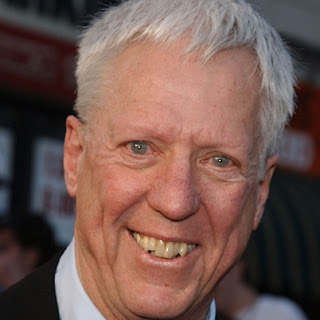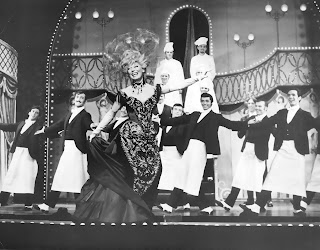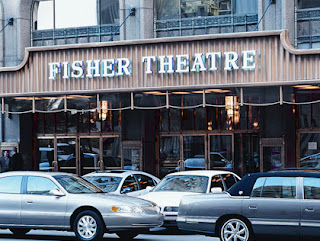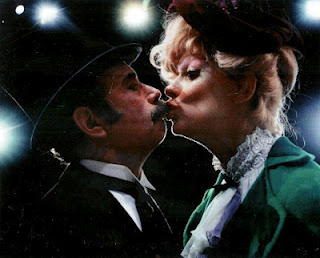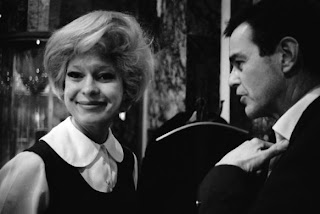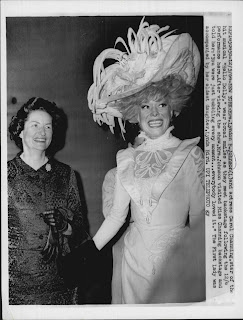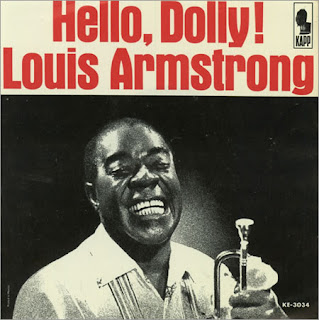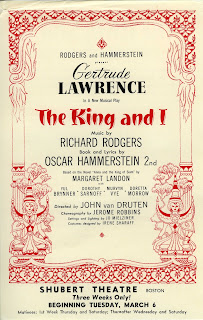David Hartman
Rudolph in Hello, Dolly! Original Company
Before getting to Dolly, I want to set the record straight. David Hartman is not the son of famed dance couple Paul and Grace Hartman. They were a nightclub dance team for decades. Paul was charming and angular and dry and they had a funny wit to them as a dance team. One night after Dolly’s
curtain came down, David got a call over the speaker that there was a gentleman
who would like to say hello. David asked for him to be sent up. This gentleman
came to the dressing room and told David that he was Paul Hartman and that
watching him onstage during The Waiter’s Gallop and the Dolly number reminded him
kind of of what he used to do on stage, then he asked David what his name was. They had a good laugh.
curtain came down, David got a call over the speaker that there was a gentleman
who would like to say hello. David asked for him to be sent up. This gentleman
came to the dressing room and told David that he was Paul Hartman and that
watching him onstage during The Waiter’s Gallop and the Dolly number reminded him
kind of of what he used to do on stage, then he asked David what his name was. They had a good laugh.
They remained in touch and David saw him a few times in
Los Angeles. They are not related!
Los Angeles. They are not related!
David was twenty seven when his agent sent him up for a
singing audition for Dolly, A Damned
Exasperating Woman in September of 1963.
David had read The Matchmaker so he pretty much knew the
storyline. He sang and Gower asked him if he could do a German accent. Davis
said, “Yes, I can” which was a complete lie. He figured that between then and
another audition, he could learn a German accent which he did.
At his call
back, several days later, he read. Gower asked if they could get together to go
over some dance moves. David informed Gower that he was not a dancer. David
said he could move. Gower invited him to come back for a dance audition. He
went to Showcase Studios on Eighth Avenue and Fifty-sixth on the east corner.
It was just music director Peter Howard and Gower. Gower taught David
thirty-six counts of something. They went through it a couple of times and
Gower asked him to do it on his own, which he did. Gower then walked over to
him very quietly and very dryly, which was the way he spoke, and he looked
David in the eye and very quietly asked, “Would you like to play Rudolph, the
headwaiter, in our production of Dolly?”
singing audition for Dolly, A Damned
Exasperating Woman in September of 1963.
David had read The Matchmaker so he pretty much knew the
storyline. He sang and Gower asked him if he could do a German accent. Davis
said, “Yes, I can” which was a complete lie. He figured that between then and
another audition, he could learn a German accent which he did.
At his call
back, several days later, he read. Gower asked if they could get together to go
over some dance moves. David informed Gower that he was not a dancer. David
said he could move. Gower invited him to come back for a dance audition. He
went to Showcase Studios on Eighth Avenue and Fifty-sixth on the east corner.
It was just music director Peter Howard and Gower. Gower taught David
thirty-six counts of something. They went through it a couple of times and
Gower asked him to do it on his own, which he did. Gower then walked over to
him very quietly and very dryly, which was the way he spoke, and he looked
David in the eye and very quietly asked, “Would you like to play Rudolph, the
headwaiter, in our production of Dolly?”
Three auditions and he was in.
 |
| (Photo: Henri Dauman) David Burns © Sony Music Entertainment Courtesy of Sony Music Archives |
Rehearsals started at the Mark Hellinger Theater in New York.
As in preparing for any show, especially a show as big as Dolly, there’s a lot
of activity.
The chorus was in the basement learning what they had to learn.
The leads were out learning their songs in the lobby. On stage, the first
sixteen days of rehearsal, eight hours a
day was spent on The Waiter’s Gallop
and the title number. This was for a
twenty two minute section of the show!
When they got to Detroit where the show would receive the name Hello, Dolly!, most of the show had not even been blocked.
From there on, it was a work in progress. When they got to Detroit, Gower
divided the show into eight pieces and announced that they were going to do one
piece at a time.
of activity.
The chorus was in the basement learning what they had to learn.
The leads were out learning their songs in the lobby. On stage, the first
sixteen days of rehearsal, eight hours a
day was spent on The Waiter’s Gallop
and the title number. This was for a
twenty two minute section of the show!
When they got to Detroit where the show would receive the name Hello, Dolly!, most of the show had not even been blocked.
From there on, it was a work in progress. When they got to Detroit, Gower
divided the show into eight pieces and announced that they were going to do one
piece at a time.
 |
| Peter Howard |
It was very organized with Peter Howard and Jerry Herman and
Michael Stewart writing.
Charles Strouse was brought in with Lee Adams and Bob
Merrill to augment the show.
Merrill to augment the show.
He was also the fourth stage manager because he only
appeared in the second act. He ended up in the closing of the first act after
the re-write.
When Parade went into
the show in DC, that got David into the first act. He was in charge of props.
He was in charge of Carol. He made sure that she had everything she needed.
appeared in the second act. He ended up in the closing of the first act after
the re-write.
When Parade went into
the show in DC, that got David into the first act. He was in charge of props.
He was in charge of Carol. He made sure that she had everything she needed.
He
ran half of the first act. It was a wonderful experience both on and off-stage.
He was involved for two years from the time he started rehearsals.
ran half of the first act. It was a wonderful experience both on and off-stage.
He was involved for two years from the time he started rehearsals.
He did about
800 performances on Broadway. There were also eight weeks on the road starting
at The Fisher Theater in Detroit, then on to four weeks at The National Theater
in Washington DC before settling into his home for the next seven years at the
St. James Theater.
800 performances on Broadway. There were also eight weeks on the road starting
at The Fisher Theater in Detroit, then on to four weeks at The National Theater
in Washington DC before settling into his home for the next seven years at the
St. James Theater.
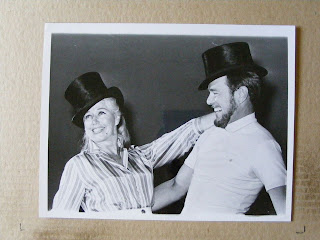 |
| Ginger Rogers rehearsing with Gower |
Their team of stage managers discussed Dolly with the second
cast that included Ginger Rogers and the international tour starring Mary Martin.
Martin was already an acquaintance. He and she had been friends for quite some
time. The stage managers would walk the various replacements through their new
roles. One interesting sideline. David never learned to type.
cast that included Ginger Rogers and the international tour starring Mary Martin.
Martin was already an acquaintance. He and she had been friends for quite some
time. The stage managers would walk the various replacements through their new
roles. One interesting sideline. David never learned to type.
When they were in
DC, Lucia Victor, production stage manager, said to David, “As soon as we get
to New York, you have to take the script in to Samuel French’s for them to have
a copy of the libretto with basic stage directions and so forth. “ She told
David that that was one of his jobs between then and them arriving in New York.
Not being a typist, David thought, “Oh my God! This is hunt and peck city!” He
did do it and put in the appropriate stage directions. He had to keep track of
all the changes in the script…and there were MANY!
DC, Lucia Victor, production stage manager, said to David, “As soon as we get
to New York, you have to take the script in to Samuel French’s for them to have
a copy of the libretto with basic stage directions and so forth. “ She told
David that that was one of his jobs between then and them arriving in New York.
Not being a typist, David thought, “Oh my God! This is hunt and peck city!” He
did do it and put in the appropriate stage directions. He had to keep track of
all the changes in the script…and there were MANY!
David was not on stage for the ill-fated Come and Be My Butterfly. David gave the eulogy at Gower’s funeral and
said, “ And, Gower, I know one day you’re going to fix Butterfly.” He tried for a year. He kept working at it after the show opened on
Broadway, which is unheard of.
said, “ And, Gower, I know one day you’re going to fix Butterfly.” He tried for a year. He kept working at it after the show opened on
Broadway, which is unheard of.
 |
| Nicole Barth, David Burns, and Bonnie Mathis Photo: Henri Dauman) © Sony Music Entertainment Courtesy of Sony Music Archives |
He was determined to make that number work. Eventually,
it was replaced with the Polka contest…when Ginger Rogers came into the show.
it was replaced with the Polka contest…when Ginger Rogers came into the show.
Gower was a master showman. It wasn’t just the music. It wasn’t
just the dialogue. It wasn’t just the performing. This is reflected in how he
directed. He would stand in the back of the theater. When he looked at the
stage, he saw the entire stage. He was a master at having one thing go on, say
down left in one, and in sixteen counts, because he was always thinking
choreographically, something would be happening upstage right, then something center
stage. He was able to bounce your attention so you never got bored. Go back to Bye Bye Birdie and think about The Telephone Hour. That number is
typical Gower. Think about that set, and the girls, all in their cubicles. Your
eye and your ear kept jumping from one place to another.
just the dialogue. It wasn’t just the performing. This is reflected in how he
directed. He would stand in the back of the theater. When he looked at the
stage, he saw the entire stage. He was a master at having one thing go on, say
down left in one, and in sixteen counts, because he was always thinking
choreographically, something would be happening upstage right, then something center
stage. He was able to bounce your attention so you never got bored. Go back to Bye Bye Birdie and think about The Telephone Hour. That number is
typical Gower. Think about that set, and the girls, all in their cubicles. Your
eye and your ear kept jumping from one place to another.
All of a sudden it was
over and you were already transitioned into the next scene without realizing,
almost, that there had been a scene change. He was constantly thinking about
diverting your attention from one point to another so that the audience never
got totally comfortable, for the most part, with what was happening at any
given moment. It was a combination of words and movement. Anyone who sees a great production of Dolly that follows these guidelines, no matter what age, is going to be fascinated by it. Gower at rehearsal once said, "That June Taylor brochure really works!"
One night in Washington, Gower was sitting in the
house seats in the theater. Edward Albee came to see the show and sat behind
Gower. Gower told everyone the next day at rehearsals that Albee sat there on
his hands and never smiled once through the entire show the night before. Gower said, “Well, he’s in theater and we’re
in show business.”
over and you were already transitioned into the next scene without realizing,
almost, that there had been a scene change. He was constantly thinking about
diverting your attention from one point to another so that the audience never
got totally comfortable, for the most part, with what was happening at any
given moment. It was a combination of words and movement. Anyone who sees a great production of Dolly that follows these guidelines, no matter what age, is going to be fascinated by it. Gower at rehearsal once said, "That June Taylor brochure really works!"
One night in Washington, Gower was sitting in the
house seats in the theater. Edward Albee came to see the show and sat behind
Gower. Gower told everyone the next day at rehearsals that Albee sat there on
his hands and never smiled once through the entire show the night before. Gower said, “Well, he’s in theater and we’re
in show business.”
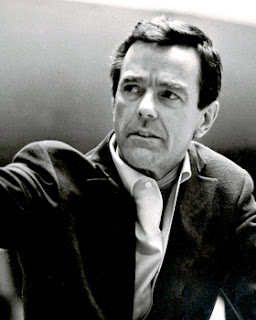 |
| Gower |
That was Gower. He was an entertainer. Look at some of the
major stars of today. The shows they are putting on, the Madonna’s and the Lady
Gagas, are extravagant shows. They hold your attention. They are bombastic and
musical and so on.
major stars of today. The shows they are putting on, the Madonna’s and the Lady
Gagas, are extravagant shows. They hold your attention. They are bombastic and
musical and so on.
That’s essentially what Gower did but in a much more formal
setting. It was the same idea. If young people see Dolly, they will see that
the music is fun and it’s a charming show.
It’s beautiful in some places. Parade and Sunday Clothes are absolutely overwhelmingly beautiful musical
choral numbers.
setting. It was the same idea. If young people see Dolly, they will see that
the music is fun and it’s a charming show.
It’s beautiful in some places. Parade and Sunday Clothes are absolutely overwhelmingly beautiful musical
choral numbers.
You get a smattering of all different types of music in what Jerry
wrote.
wrote.
People think it has changed with STARS leading shows today.
It was like that then, too, with stars like Ginger Rogers and Betty Grable and
Ethel Merman and Mary Martin. They were great stars. The desire is those cash
registers ringing at the box office.
It was like that then, too, with stars like Ginger Rogers and Betty Grable and
Ethel Merman and Mary Martin. They were great stars. The desire is those cash
registers ringing at the box office.
David would go on to do only one more Broadway musical, the
ill-fated The Yearling.
ill-fated The Yearling.
What a gift
Dolly was! It was David’s first Broadway show. Before that, he had only done
summer stock and off-Broadway, most notably Best
Foot Forward starring a young Liza Minnelli and with a young Christopher Wallken
in the chorus. For your first Broadway
show to be one of the greatest musicals of all time is a privilege.
Dolly was! It was David’s first Broadway show. Before that, he had only done
summer stock and off-Broadway, most notably Best
Foot Forward starring a young Liza Minnelli and with a young Christopher Wallken
in the chorus. For your first Broadway
show to be one of the greatest musicals of all time is a privilege.
The material dictates what it is. The material also dictates
the movement which is Gower. He didn’t want anything to stop or slow down.
They
spent weeks rehearsing the feed store scene. If a line didn’t work, he would
have Michael Stewart rewrite it or delete it. He wouldn’t continue to suffer,
usually, if something wasn’t working. He simply said, “Let’s redo it.” Once he
had an idea in the Hay and Feed store. This involved the trap door.
the movement which is Gower. He didn’t want anything to stop or slow down.
They
spent weeks rehearsing the feed store scene. If a line didn’t work, he would
have Michael Stewart rewrite it or delete it. He wouldn’t continue to suffer,
usually, if something wasn’t working. He simply said, “Let’s redo it.” Once he
had an idea in the Hay and Feed store. This involved the trap door.
Gower had
this idea that he wanted a fire coming out of the trap door! That turned into
exploding cans coming out all over the stage. The prop master, Harold
Caulfield, was told by Gower what he wanted. He went to work on it and five
days later, showed Gower what he had done.
this idea that he wanted a fire coming out of the trap door! That turned into
exploding cans coming out all over the stage. The prop master, Harold
Caulfield, was told by Gower what he wanted. He went to work on it and five
days later, showed Gower what he had done.
He walked on stage of the Fisher
Theater in Detroit to show Gower. As stage manager, David had to be underneath
the stage of the feed store to execute this with electrical contacts that were
going to throw tin cans all over the stage. They tried it ONCE and the cans
went everywhere. Gower just said, “No, I don’t think that’s
going to work but thanks a lot.” Harold, who had been working on this for five
days, said to David, “Isn’t it great to be in the big time?”
Theater in Detroit to show Gower. As stage manager, David had to be underneath
the stage of the feed store to execute this with electrical contacts that were
going to throw tin cans all over the stage. They tried it ONCE and the cans
went everywhere. Gower just said, “No, I don’t think that’s
going to work but thanks a lot.” Harold, who had been working on this for five
days, said to David, “Isn’t it great to be in the big time?”
Gower was open to suggestions from the cast. It was Sondra
Lee, as Minnie Fay, who suggested to Gower Minnie’s dance around Dolly at the
end of the Dancing number.
Lee, as Minnie Fay, who suggested to Gower Minnie’s dance around Dolly at the
end of the Dancing number.
That moment is still recreated in productions to
this day.
this day.
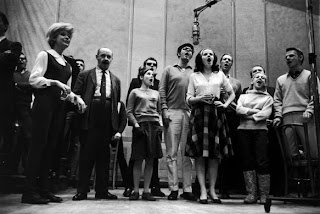 |
Left
|
David suggested to Gower the idea of Rudolph conducting the waiters during the Waiter’s Gallop like he was conducting
an orchestra. In rehearsal, they got to figure out which step he should be
standing on. It may seem silly, but they figured out it was the sixth step.
an orchestra. In rehearsal, they got to figure out which step he should be
standing on. It may seem silly, but they figured out it was the sixth step.
David learned the entire waiter’s number in dance counts.
He figured out where
to point. When John Mineo jumped,he knew where to point. David conducted that
number! He wasn’t just waving his hands
about. He has noticed in subsequent productions Rudolph just waving his arms
about.
to point. When John Mineo jumped,he knew where to point. David conducted that
number! He wasn’t just waving his hands
about. He has noticed in subsequent productions Rudolph just waving his arms
about.
It doesn’t matter. It still works like gangbusters. You just bring
energy and fun to the role.
energy and fun to the role.
Once Carol caught her heel in the hem of her petticoats
during the Dolly number.
during the Dolly number.
She was on the ramp and got caught. She didn’t dare
take a step or move. David ran off stage and got a pair of scissors and ran out
onto the ramp and cut the hem away like any good headwaiter would do.
take a step or move. David ran off stage and got a pair of scissors and ran out
onto the ramp and cut the hem away like any good headwaiter would do.
Once the show opened in New York, it was pretty much routine.
That being said, you still go out and do it full out as if you’ve never done it
before. That was never difficult to do. That sequence of twenty two minutes is
an astounding twenty two minutes on stage. It was great fun and great energy
and when Carol entered for the Dolly number, it was magic.
That being said, you still go out and do it full out as if you’ve never done it
before. That was never difficult to do. That sequence of twenty two minutes is
an astounding twenty two minutes on stage. It was great fun and great energy
and when Carol entered for the Dolly number, it was magic.
There are too many wonderful memories to try and whittle
down to one.
down to one.
It was just a marvelous experience.
Funny Girl, which opened the same year on March 26th,
1964 had an Actors Fund Benefit. The following Sunday at the St. James, Hello, Dolly also did a benefit. It’s
a show biz crowd. All the gypsies were there. There was enthusiastic applause
after ever number especially after The
Waiters Gallop and Hello, Dolly! They were standing on their seats and
screaming. It was a wonderful experience to have people who are on a stage
every day appreciate what this cast was doing and to celebrate what Gower
Champion, Jerry Herman, Peter Howard, and Michael Stewart had created.
1964 had an Actors Fund Benefit. The following Sunday at the St. James, Hello, Dolly also did a benefit. It’s
a show biz crowd. All the gypsies were there. There was enthusiastic applause
after ever number especially after The
Waiters Gallop and Hello, Dolly! They were standing on their seats and
screaming. It was a wonderful experience to have people who are on a stage
every day appreciate what this cast was doing and to celebrate what Gower
Champion, Jerry Herman, Peter Howard, and Michael Stewart had created.
It was a
real collaborative effort on behalf of the creators and of course Thornton
Wilder, with The Matchmaker.
real collaborative effort on behalf of the creators and of course Thornton
Wilder, with The Matchmaker.
It turned out pretty well. The one thing that
David took forth for the rest of his career was a true sense of collaboration.
No one works alone. Anyone who thinks that do believe their own press releases
which is dangerous stuff. Everyone has to work together. Gower said in
Washington that the dance numbers weren’t that great. The material itself is
not that great. The direction is not that great. The responsibility rested on
the shoulders of the cast.
David took forth for the rest of his career was a true sense of collaboration.
No one works alone. Anyone who thinks that do believe their own press releases
which is dangerous stuff. Everyone has to work together. Gower said in
Washington that the dance numbers weren’t that great. The material itself is
not that great. The direction is not that great. The responsibility rested on
the shoulders of the cast.
He encouraged the cast to do 108% every performance
or everything would be dead. He was depending upon performance. It had to be full
out non stop every performance.
or everything would be dead. He was depending upon performance. It had to be full
out non stop every performance.
On a side note, David had been a baseball player. For a
brief moment, he thought about pursuing pro baseball, but decided against it. All
the Broadway shows have their own softball teams and play as part of the
Broadway softball league. David went to Mr. Merrick and asked if he would buy
the caps, the t-shirts balls, and bats. Mr. Merrick did not want to do it. Typical
of Mr. Merrick. He finally gave in, but said to David, “If any one of my
dancers gets hurt and misses a performance, you’re fired, responsible!” or words to that effect. He made it very clear that if anyone got
hurt, there would be hell to pay! David played first base. At the first game,
he stretched for a ball on a throw and popped his hamstring. He heard it pop.
What went through his head at that moment was, “Oh my God! I’m going to be
fired.” For the next two or three performances, no one knew he was in huge
pain.
brief moment, he thought about pursuing pro baseball, but decided against it. All
the Broadway shows have their own softball teams and play as part of the
Broadway softball league. David went to Mr. Merrick and asked if he would buy
the caps, the t-shirts balls, and bats. Mr. Merrick did not want to do it. Typical
of Mr. Merrick. He finally gave in, but said to David, “If any one of my
dancers gets hurt and misses a performance, you’re fired, responsible!” or words to that effect. He made it very clear that if anyone got
hurt, there would be hell to pay! David played first base. At the first game,
he stretched for a ball on a throw and popped his hamstring. He heard it pop.
What went through his head at that moment was, “Oh my God! I’m going to be
fired.” For the next two or three performances, no one knew he was in huge
pain.
He couldn’t let on because he couldn’t miss a performance. That was the
worst of his Dolly experience.
worst of his Dolly experience.
Another wonderful night was their closing night in DC. Gower
threw a party at one of the hotels near the theater in the ball room. About one
o’clock in the morning, Gower got up to get everyone’s attention. He said he
had a surprise for everyone.
threw a party at one of the hotels near the theater in the ball room. About one
o’clock in the morning, Gower got up to get everyone’s attention. He said he
had a surprise for everyone.
He played Louis Armstrong’s new recording of Hello, Dolly. That song of course helped
build the show’s publicity.
build the show’s publicity.
Jerry Herman is just the master according to David. What can
you say with all of the musicals that he wrote and he wrote it all with such
warmth and such genuine feeling and respect for people and that comes through his
music with such sensitivity with everything he writes. He is just wonderful.
you say with all of the musicals that he wrote and he wrote it all with such
warmth and such genuine feeling and respect for people and that comes through his
music with such sensitivity with everything he writes. He is just wonderful.
David Burns was so wonderful and kept everyone on their toes
on stage. He had a great sense of humor. His willingness to be the foil to
Carol helped make her all the better. David Burns was responsible in a lot of
ways for Carol being as terrific as she was in the role because of his
responses to her. That is what a professional he was. He was the real deal. He
knew how to do a take and when to do it, how strong it should be and why.
on stage. He had a great sense of humor. His willingness to be the foil to
Carol helped make her all the better. David Burns was responsible in a lot of
ways for Carol being as terrific as she was in the role because of his
responses to her. That is what a professional he was. He was the real deal. He
knew how to do a take and when to do it, how strong it should be and why.
David Burns was just awesome. In the docket scene, towards the end of the show, Eileen Brennan and
Charles Nelson Reilly, Jerry Dodge, Sondra Lee, Gordon Connell, and David
Hartman, and Mary Jo Catlett were all in the docket. David Burns was sort of in the back in the
middle but they were all jammed in there together. Charles Nelson Reilly and
Eileen Brennan are singing It Only Takes
a Moment.
Charles Nelson Reilly, Jerry Dodge, Sondra Lee, Gordon Connell, and David
Hartman, and Mary Jo Catlett were all in the docket. David Burns was sort of in the back in the
middle but they were all jammed in there together. Charles Nelson Reilly and
Eileen Brennan are singing It Only Takes
a Moment.
It’s a very nice warm
loving moment. A lot of the time while that was going on, Burns was just making
“trouble” for everybody in the docket. He was moaning and touching Mary Jo
Catlett and saying, “Oh, My God, woman, you are amazing. Don’t touch me now,
don’t touch me.” It was quiet enough so that those in the docket could hear it.
It was so hard to keep a straight face with Davey having a lot of fun on stage.
loving moment. A lot of the time while that was going on, Burns was just making
“trouble” for everybody in the docket. He was moaning and touching Mary Jo
Catlett and saying, “Oh, My God, woman, you are amazing. Don’t touch me now,
don’t touch me.” It was quiet enough so that those in the docket could hear it.
It was so hard to keep a straight face with Davey having a lot of fun on stage.
The biggest change that David has seen in the business since
Dolly is the insurgence of microphones and over amplification. There were a few
microphones in Dolly. Carol and Davie Burns were wearing mics, but as David
recalls no one else was, perhaps the other principals. They had to SING. They
had to bounce it off the back wall. David misses that. He misses having
everything so over hyped sound wise and blowing you out of the theater.
Everything is over micked today, even in the smallest theaters. That is the nature
of the beast, especially nowadays when everything is so rock-y with rock type
musicals. David considers himself old school. He’d like to see a turn back, but
doesn’t think it’s going to happen.
Dolly is the insurgence of microphones and over amplification. There were a few
microphones in Dolly. Carol and Davie Burns were wearing mics, but as David
recalls no one else was, perhaps the other principals. They had to SING. They
had to bounce it off the back wall. David misses that. He misses having
everything so over hyped sound wise and blowing you out of the theater.
Everything is over micked today, even in the smallest theaters. That is the nature
of the beast, especially nowadays when everything is so rock-y with rock type
musicals. David considers himself old school. He’d like to see a turn back, but
doesn’t think it’s going to happen.
David grew up in the New York burbs and his parents loved
Broadway musicals. He went to a lot of original shows when he was a kid, The Sound of Music, Carousel, Oklahoma!, The King and I, all the originals, the crème
of the crop of Broadway musicals. To have been in Hello, Dolly! as your first
musical and to have it be the blockbuster that it was, to have gone for it and
make it happen, is a real privilege.
Broadway musicals. He went to a lot of original shows when he was a kid, The Sound of Music, Carousel, Oklahoma!, The King and I, all the originals, the crème
of the crop of Broadway musicals. To have been in Hello, Dolly! as your first
musical and to have it be the blockbuster that it was, to have gone for it and
make it happen, is a real privilege.
The following was read by David at Gower Champion Memorial Service
Winter Garden Theater August 28, 1980
Remarks: David Hartman I’m David Hartman. I’m here because Gower Champion gave me my first job on Broadway as Rudolph, the German headwaiter, in the original cast of Hello, Dolly!
Winter Garden Theater August 28, 1980
Remarks: David Hartman I’m David Hartman. I’m here because Gower Champion gave me my first job on Broadway as Rudolph, the German headwaiter, in the original cast of Hello, Dolly!
Some memories for those of you here among the “Hello, Dolly,” alumni: Gower gave many of us “that first chance.” He had no assurance that we’d come through…took the chance anyway. He touched all of us, whether we were on stage or in the audience. And a few of us lucky ones were fortunate enough to have shared his “exploring,” his “trial and error” process of choreographing…like the excitement of finding the exact moment to flip our hands out in a classic “Gower” hand-flip move.
He always had that little glint in his eye as he worked… “do me something, anything…yeah yeah yeah, keep THAT.”
The results were all HIS, really, but he made you feel like YOU had actually created something.
Fall 1963. The Mark Hellinger Theater. 51st Street just off Broadway, was “dark.” “My Fair Lady” had made that theater hallowed ground. That’s where we rehearsed “Hello, Dolly…” on the stage, in the lobby, the lower lobby and the basement under the stage.
For the first two weeks…fourteen days…from 10 AM until 6…Gower created and rehearsed only two numbers. Half of our total rehearsal time…only two numbers. Great scheduling. Fourteen days…twenty men, and one woman, two numbers.
Fall 1963. The Mark Hellinger Theater. 51st Street just off Broadway, was “dark.” “My Fair Lady” had made that theater hallowed ground. That’s where we rehearsed “Hello, Dolly…” on the stage, in the lobby, the lower lobby and the basement under the stage.
For the first two weeks…fourteen days…from 10 AM until 6…Gower created and rehearsed only two numbers. Half of our total rehearsal time…only two numbers. Great scheduling. Fourteen days…twenty men, and one woman, two numbers.
Then, on October 20, 1963, Sunday afternoon…in the dreary, dark chill…in khakis and tights and leg warmers and tennis shoes... with folding chairs and adhesive tape and Peter Howard playing that crumby upright piano, Gower said, “Let’s try it. Both numbers. “Waiters” and “Dolly.” As Walter Kerr wrote later in the New York Herald Tribune, “Mr. Champion’s dancers began exploding through the floor, out of their minds once, again. And, when peace was restored, the curtains parted and down the long stairway, red on red, came Carol Channing.” When Peter played the final chord, with singer’s and dancer’s voices bouncing off the walls of the Mark Hellinger, we hit “that pose…” with arms outstretched all facing Carol. In the absolute hush and stillness on that dank Sunday afternoon, Gower walked ever so slowly out of the dark recesses of the back orchestra seats to the front of the ramp built around the pit for these two numbers.
He hesitated for what seemed an eternity, then, simply and quietly, made one of the “Broadway Musical” understatements of all time. “I think we’ve got something.”
He did have “something,” and, he gave it to all of us. He showed us how to love it. He gave each of us on stage a few moments of a lifetime…the moments that kids (and older folks, too) dream about… moments so electric, you could hardly stand it. He said, more than once, “the dance steps aren’t that great. Choreography either. Go out and give it 108% or we’re all ‘FINISHED!’” He made you feel downright creative when deep down you knew you were really just up there jumping around having the most fun of your life. And the audience…they’d smile…then laugh…then SCREAM because they couldn’t keep it in. They’d leave the St. James, head down 44th Street, inching along, embarrassedly wanting to try, well, maybe, just one of those little “Gower” steps…humming all the way…”Hellohhhh, Dolly.”
He did have “something,” and, he gave it to all of us. He showed us how to love it. He gave each of us on stage a few moments of a lifetime…the moments that kids (and older folks, too) dream about… moments so electric, you could hardly stand it. He said, more than once, “the dance steps aren’t that great. Choreography either. Go out and give it 108% or we’re all ‘FINISHED!’” He made you feel downright creative when deep down you knew you were really just up there jumping around having the most fun of your life. And the audience…they’d smile…then laugh…then SCREAM because they couldn’t keep it in. They’d leave the St. James, head down 44th Street, inching along, embarrassedly wanting to try, well, maybe, just one of those little “Gower” steps…humming all the way…”Hellohhhh, Dolly.”
They’d been “had…” by the Gower magic.
For all of us, on stage and out front, thanks Gower, for the joy you’ve given us. Marge mentioned that you’re a perfectionist. As all you Dolly alumni remember…”Gower, we know that one of these days you’re finally FIX BUTTERFLIES!”Thank
For all of us, on stage and out front, thanks Gower, for the joy you’ve given us. Marge mentioned that you’re a perfectionist. As all you Dolly alumni remember…”Gower, we know that one of these days you’re finally FIX BUTTERFLIES!”Thank
you David Hartman for the gifts you have given to the world and will continue
to give!
The Other Players
- I Put My Hand In (The Original Players)
- Nicole Barth
- Mary Jo Catlett
- Marge Champion
- Gordon Connell
- Joel Craig
- Terry DeMari (Dance Captain 1965-1968)
- David Hartman (Rudolph)
- Jerry Herman
- Lee Hooper
- Charles Karel (Standby for Cornelius and Ambrose Kemper)
- Sondra Lee (Original Minnie Fay)
- Saul Schechtman
- Ron Young (Townspeople, Waiters, Etc.)
- TO A TRUMP LADY FAIR: Channing was replaced by Hollywood glamour queen Ginger Rogers on August 9, 1965.
- Betty Grable Broadway Company: June 12, 1967- November 5th, 1967
- Mary Martin International Company
- Ethel Merman Company
- Betty Grable Tour
- Pearl Bailey/Cab Callaway 1967 Broadway Company
- Yvonne DeCarlo Company
- Carol Channing’s First Road Company (1966)
- Carol Channing 1983 (20th Anniversary) road Company
- Pearl Bailey 1975 Revival
- Eve Arden Chicago Company 1967
- Carol Channing/Jay Garner 1994 Tour and 1995 Broadway Revival
- Dorothy Lamour Bus and Truck Company (1967 40 Week Tour) and Las Vegas (August 1967)
- Barbra Streisand, Motion Picture
- Danny La Rue’s London Company
- Press Agents
- Regional Theaters/Summer Stock/Community Theatres
- Kate Baldwin
- Jack Bannon
- Gary Beach
- John Beasley
- Mo Brad
- Rick Bumgardner
- Mark Chapman
- Walter Charles
- Wayne Cilento
- Marcia Milgrom Dodge
- Beth Fowler (Irene Molloy in Molly Picon’s Hello, Dolly, Summers of 71 and 72)
- Matt Loehr
- Brad Kenney and Jayme McDaniel
- Nancy Opel
- Larry Raben
- Mary Robin Roth
- Deborah Savage
- Tony Sheldon
- Tours
- Directors
- Madeline Kahn/Conrad John Schuck Production
- Musical Arrangers/Conductors
- Various Companies
- Friends and Fans
- 2017 Broadway Revival
- Charles Strouse
- Three time Tony Nominee Lewis J. Stadlen: Horace Vandergelder to Andrea Martin, Leslie Uggams, Randy Graff, Lee Roy Reams…and upcoming: Betty Buckey!
- Michael McCormick
- Gower Champion
